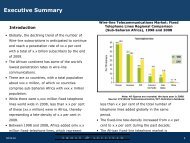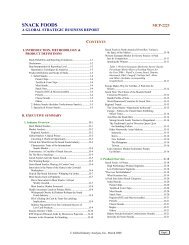the RUSSIA oil & gas competitive intelligence report - Report Buyer
the RUSSIA oil & gas competitive intelligence report - Report Buyer
the RUSSIA oil & gas competitive intelligence report - Report Buyer
Create successful ePaper yourself
Turn your PDF publications into a flip-book with our unique Google optimized e-Paper software.
Russia Oil and Gas Competitive Intelligence <strong>Report</strong> 2010<br />
In <strong>the</strong> past, Gazprom has successfully managed to fend off attempts by <strong>the</strong> Finance Ministry to increase<br />
its tax burden by arguing that it already faces extremely high new-generation E&P costs. This time,<br />
Gazprom has suggested that ra<strong>the</strong>r than increasing tax on production and exports, an import tariff should<br />
be introduced. Taxing <strong>the</strong> <strong>gas</strong> that Gazprom purchases from Central Asia (and resells to Europe) would<br />
likely cost <strong>the</strong> company less as <strong>the</strong> volumes it buys from abroad are significantly lower than its domestic<br />
output. Putin has responded to Gazprom's proposal saying that as <strong>the</strong> introduction of import tariffs were<br />
'not just an economic question', <strong>the</strong> government would look into <strong>the</strong> issue at a later stage.<br />
Offshore Exploration<br />
Russia may relax rules effectively limiting offshore E&P in <strong>the</strong> country to Rosneft and Gazprom,<br />
according to a <strong>report</strong> by <strong>the</strong> Moscow Times newspaper in March 2010. The <strong>report</strong>, which cited deputy<br />
energy minister Sergei Donskoy, said <strong>the</strong> proposal would allow subsidiaries of <strong>the</strong> two companies to join<br />
<strong>the</strong>m in offshore exploration and could lead to IOCs also becoming involved.<br />
In <strong>the</strong> Moscow Times article Donskoy claimed that <strong>the</strong> NREM believes Gazprom and Rosneft have<br />
insufficient resources to develop Russia's continental shelf on <strong>the</strong>ir own. Under a plan drafted by <strong>the</strong><br />
ministry, <strong>the</strong> companies would be allowed to share access with <strong>the</strong>ir subsidiaries and could farm out a<br />
stake of up to 50% in offshore projects to foreign companies. The proposal would also allow any of <strong>the</strong><br />
subsidiaries to develop offshore fields on <strong>the</strong>ir own or in partnership with o<strong>the</strong>r companies. However, <strong>the</strong><br />
newspaper also <strong>report</strong>ed that it is unclear whe<strong>the</strong>r <strong>the</strong> proposal has been submitted to <strong>the</strong> Russian cabinet.<br />
Under legislation passed in 2008, offshore fields in Russia can only be developed by companies in which<br />
<strong>the</strong> government owns a stake of 50% or greater. In addition, companies applying to work on <strong>the</strong> fields<br />
must have a five-year record of working on such projects, effectively limiting participation to Gazprom<br />
and Rosneft. It is arguable that this has damaged Russian investment in offshore areas. The two<br />
companies invested only RUR56.4bn (US$1.9bn at 2010 rates) in E&P offshore Russia in 2008, a rate<br />
that Donskoy claimed would mean ministry targets for offshore areas would take 165 years to fulfil.<br />
Government Policy<br />
Under <strong>the</strong> Energy Strategy 2030, Russia is expecting to sustain its <strong>oil</strong> output at roughly 2009 levels and<br />
dramatically boost <strong>gas</strong> production. The plan, drafted in August and approved in November 2009, calls for<br />
annual production of 10.6-10.7mn b/d of <strong>oil</strong> and 885-940bcm of <strong>gas</strong> by 2030. Exports of crude and <strong>oil</strong><br />
products are expected to rise to 6.6mn b/d while <strong>gas</strong> sales abroad are to reach 349-368bcm by that year.<br />
Most of <strong>the</strong> extra <strong>gas</strong> exports are expected to be absorbed by Asia. To achieve <strong>the</strong> set output growth, <strong>the</strong><br />
government wants an annual investment of US$28.4bn (late 2009 exchange rate) in <strong>the</strong> <strong>oil</strong> sector and<br />
US$27bn in <strong>the</strong> <strong>gas</strong> sector. The <strong>oil</strong> output target is <strong>the</strong>oretically achievable, especially after a downward<br />
revision of <strong>the</strong> August 2009 draft. The level of capex outlined in <strong>the</strong> plan, however, is unlikely to be<br />
sufficient. Gas production goals look extremely ambitious outright given <strong>the</strong> current volumes and<br />
dynamics of <strong>the</strong> global supply and demand.<br />
© Business Monitor International Ltd Page 9









